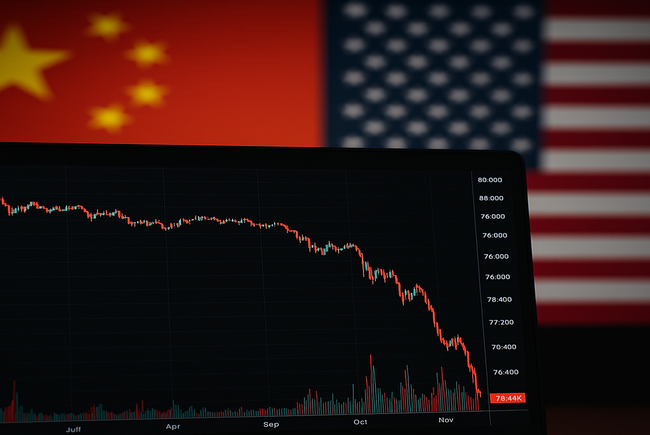Tensions between the United States and China escalated Today after the Trump administration announced a 104% tariff hike on Chinese imports, set to take effect within hours. The move follows China’s $50 billion sell-off in U.S. Treasuries, an apparent retaliation to prior tariff actions.
The latest round of economic measures has rattled global markets. Bitcoin, which had briefly surged to $80,200 earlier in the day, fell sharply by more than 9%, dropping to $76,400 in the hours following the White House announcement. The S&P 500 opened the day with a 4% gain but pared back gains as geopolitical risks rose.
🇺🇸🇨🇳 The tariff situation showed a brief period of brightness today, as Bitcoin reached $80.2K again and the S&P 500 started up on the day by ~+4%. However, no notable positive progress has been announced on tariff negotiations. Developments of note:
— Santiment (@santimentfeed) April 8, 2025
📌 Bitcoin is back down to… pic.twitter.com/OrNEmJhBJH
China Dumps U.S. Debt Amid Heightened Trade Tensions
Beijing’s decision to offload $50 billion in U.S. government bonds marked the most significant single-day sell-off of Treasuries by China in recent memory. Analysts see the move as a direct signal of financial pushback against the escalating tariff dispute.
The Treasury Department has not commented on the sell-off, but the market impact was immediate. Yields spiked in early trading, and analysts noted growing concerns about reduced foreign appetite for U.S. debt if the conflict persists.
Although the U.S. had initially indicated openness to renegotiation following former President Trump’s “Liberation Day” remarks, talks have since stalled, with no clear diplomatic engagement.
Investors Brace for Prolonged Market Volatility
Market observers warn that volatility could persist in the absence of a resolution. Despite large price swings, there has been no significant increase in retail short positions or sell-offs by major investors, suggesting hesitation to make directional bets amid deep uncertainty.
Cryptocurrency traders are also watching closely. Bitcoin’s sharp dip is being seen not just as a reaction to tariffs but also as a signal that digital assets are increasingly tied to macroeconomic and geopolitical developments.
For now, all eyes remain on potential responses from Beijing and the Federal Reserve’s stance on managing yield pressure in the bond market. No public statement has yet been issued by President Biden or top Chinese officials regarding the next steps.
Related posts:
- Michael Saylor Says BTC Price Could Hit $1.3M
- Bitcoin Unlikely to Surge Before US Elections, Historical Data Suggests
- US Bitcoin ETFs, BTC Price, Plummet amid Ongoing Middle East Crisis
- Bitcoin Search Interest Hits Lowest Level in a Year Despite Price Surge
- Bitcoin Sees Major Movement as 49,700 BTC From Dormant Wallets Resurfaces






